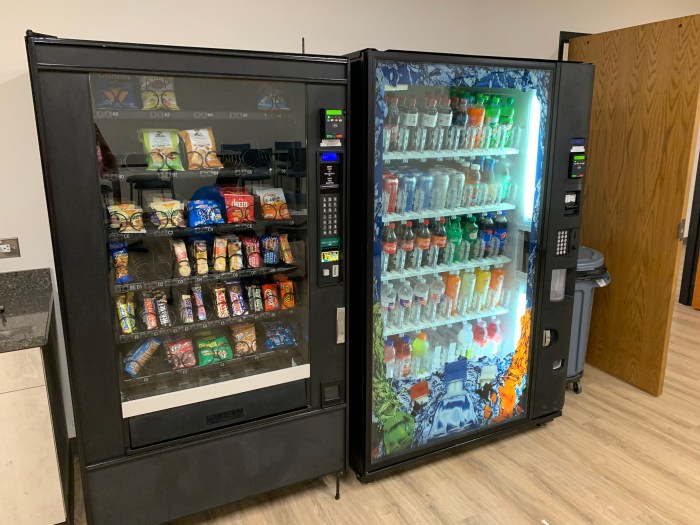Ever dreamed of owning a business that practically runs itself? Think of the sweet, sweet sound of coins dropping into a vending machine, 24/7. That’s the beauty of the vending machine business – it’s like a semi-passive money machine.
You set it up, stock it with the right goodies, and watch the cash roll in. It’s not as simple as it sounds, though. You’ll need to learn the ropes, find the right locations, and make sure you’re always one step ahead of the game.
This guide will take you from newbie to vending machine mogul, step by step. Ready to make some serious dough? Let’s get started!
This guide will cover everything from choosing the right vending machine to finding the best locations, stocking your machines with the most popular products, and marketing your business to attract hungry customers. We’ll also cover the legal aspects of running a vending machine business, including permits and licenses.
You’ll learn how to manage your inventory, collect payments, and keep your machines running smoothly. We’ll even give you some tips on preventing vandalism and theft. By the time you’re done reading this, you’ll have all the knowledge you need to build a successful vending machine business and watch your profits grow.
Understanding the Vending Machine Business
Think of vending machines as little robots that sell snacks, drinks, and even things like phone chargers and headphones, all day and night, without needing a cashier. They’re like mini-stores that can be placed in high-traffic areas, making them a popular choice for entrepreneurs looking for a semi-passive income stream.
Types of Vending Machines
The type of vending machine you choose depends on the products you want to sell and the location you’re targeting. Here’s a breakdown of common vending machine types:
- Snack and Beverage Vending Machines:These are the most common type, dispensing a wide variety of snacks, candy, chips, and drinks. They’re suitable for locations with high foot traffic, such as schools, offices, gyms, and public transportation hubs.
- Bulk Vending Machines:These machines dispense larger quantities of products, like laundry detergent, soap, and other household items. They’re often found in apartment buildings, laundromats, and other locations where residents might need to replenish supplies.
- Cold Food Vending Machines:These machines keep food items chilled and are perfect for selling sandwiches, salads, yogurt, and other perishable foods. They’re often found in hospitals, factories, and other locations where people might need a quick and convenient meal.
- Hot Food Vending Machines:These machines offer a variety of hot meals, like pizza, pasta, and soups. They’re commonly found in airports, train stations, and other locations with high demand for quick and affordable meals.
- Specialty Vending Machines:These machines offer a range of unique products, such as electronics, phone accessories, and even fresh produce. They’re often placed in locations where there’s a demand for specific items, such as airports, universities, and hospitals.
Potential Profits and Challenges
The profit potential of a vending machine business can vary significantly depending on factors like location, product pricing, and operating costs. However, with careful planning and execution, vending machine businesses can generate substantial income.
- Potential Profits:The profit margin for vending machines can range from 20% to 50%, depending on the product and operating costs. For example, a vending machine that sells a $1 can of soda could generate a profit of $0.20 to $0.50 per sale.
With high traffic, a single machine can easily generate hundreds of dollars in profit per month.
- Challenges:While the potential profits are enticing, there are also challenges to consider. These include:
- Inventory Management:Keeping track of inventory levels and restocking machines regularly is crucial to avoid losing sales and customer satisfaction.
- Maintenance and Repairs:Vending machines require regular maintenance and repairs to ensure they’re functioning properly. These costs can add up over time.
- Competition:The vending machine market is competitive, so you’ll need to find unique selling propositions to stand out and attract customers.
- Location Costs:Securing prime locations for your vending machines can be expensive, especially in high-traffic areas.
- Security:Vending machines can be targets for vandalism and theft, so you’ll need to implement security measures to protect your equipment and inventory.
Legal Requirements and Permits
Before you can start operating a vending machine business, you need to comply with various legal requirements and obtain necessary permits.
- Business License:You’ll need to obtain a business license from your local municipality to operate a vending machine business.
- Vending Machine Permit:Most states require a vending machine permit to operate vending machines in public places.
- Health and Safety Permits:If you’re selling food or beverages, you’ll need to comply with health and safety regulations and obtain any necessary permits, such as a food handler’s license or a permit for your vending machine.
- Insurance:You’ll need to obtain liability insurance to protect your business from potential lawsuits.
- Sales Tax:You’ll need to collect and remit sales tax on all sales made through your vending machines.
Choosing the Right Vending Machine and Location
Selecting the right vending machine and location is crucial for your success in the vending business. This section will help you navigate these critical decisions, ensuring you’re set up for a profitable journey.
Building a vending machine business can be like building a basketball team – you need the right strategy, the right moves, and a whole lot of hustle. You gotta be like Kobe, always striving for greatness. Read more about his incredible journey and what he left behind in What Kobe Left Behind The Playbook from an Extraordinary Life.
And just like Kobe, you can create your own winning playbook, one snack at a time.
Vending Machine Selection
Choosing the right vending machine is a significant step. You need to consider several factors to make the best decision for your business.
- Product Type: What are you going to sell? Are you focusing on snacks, drinks, hot food, or something more specialized? The type of products you offer will dictate the type of vending machine you need. For example, a snack and drink vending machine is different from a hot food vending machine.
- Location: Where will your vending machine be located? This will affect the size and type of machine you need. For example, a high-traffic area like a busy train station might require a larger machine with a wider variety of products than a smaller office building.
- Budget: How much can you afford to spend on a vending machine? Prices vary greatly depending on the features, size, and brand of the machine.
- Maintenance and Repair: Consider the cost of maintaining and repairing the vending machine. Some machines are easier to maintain than others, and some manufacturers offer better warranties.
Location Selection
Choosing the right location for your vending machine is just as important as choosing the right machine. You want to find a location with high traffic and a target audience that aligns with your product offerings.
- High Traffic Areas: Look for locations with a lot of foot traffic, such as train stations, airports, malls, and busy office buildings.
- Target Audience: Consider your target audience. Are you targeting students, office workers, gym-goers, or travelers? Choose a location that aligns with your target audience.
- Competition: Look for locations with little or no competition. If there are already several vending machines in an area, you may have a harder time attracting customers.
- Accessibility: Ensure your vending machine is easily accessible to customers. It should be located in a well-lit and safe area.
Location Comparison
Here’s a table comparing the pros and cons of various vending machine locations:
| Location | Pros | Cons |
|---|---|---|
| Office Buildings | Steady flow of customers, potential for repeat business, captive audience | Limited hours of operation, competition from other vending machines, potential for lower sales during holidays and vacations |
| Schools | High traffic during school hours, potential for repeat business, opportunity to sell healthy snacks | Limited hours of operation, potential for vandalism, regulations regarding food and beverage sales |
| Gyms | Target audience interested in healthy snacks and drinks, potential for high sales during peak hours, opportunity to sell protein bars and other fitness-related products | Limited hours of operation, competition from other vending machines, potential for lower sales during off-peak hours |
| Retail Stores | High traffic, potential for impulse purchases, opportunity to sell complementary products | Competition from other vending machines, potential for lower sales during off-peak hours, limited space for vending machines |
Setting Up Your Vending Machine Business
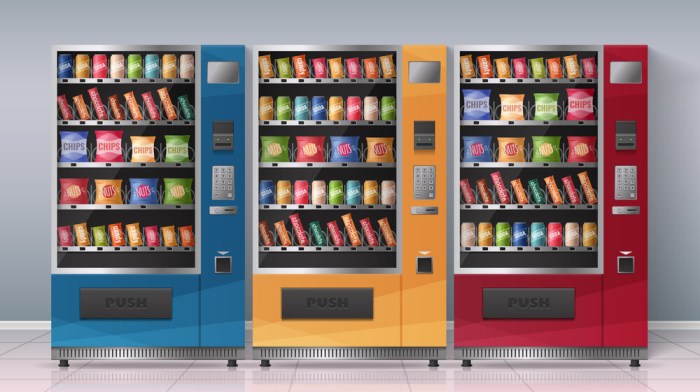
Alright, you’ve got the vending machine bug, you’ve scoped out the perfect location, and you’re ready to turn your idea into a real-life cash-generating machine. Let’s get down to the nitty-gritty of setting up your vending machine business, starting with finding the right vending machine for your needs.
Sourcing and Purchasing Vending Machines
You’re going to need a vending machine, duh! But before you go all out and buy the biggest, flashiest one you can find, let’s talk about some key considerations. First, you need to decide what kind of products you want to sell.
Building a vending machine business can be like building a tiny altar to your future self – a place to put your hustle and hope, and watch it grow. And just like the author of Tiny Altars A Midlife Revival says, it’s about finding your own path to a fulfilling life.
So, if you’re ready to ditch the 9-to-5 grind and create a side hustle that actually pays off, then maybe a vending machine business is your ticket to a more relaxed, and more profitable, future.
This will dictate the type of vending machine you need. Are you selling snacks, drinks, hot food, or something else entirely?
- Cost:Vending machines come in a wide range of prices, from a few hundred dollars for basic models to thousands for high-tech machines with advanced features. Consider your budget and how much you can afford to invest upfront. Remember, you’ll also need to factor in the cost of installation, maintenance, and any necessary permits or licenses.
- Features:Some features to consider include:
- Cashless Payment Options:More and more people are ditching cash, so it’s important to offer a variety of payment options like credit cards, debit cards, and mobile wallets. Some machines can even accept contactless payments.
- Inventory Management:Some vending machines have features that help you track inventory levels, so you know when to restock. This can save you time and money in the long run.
- Security:Look for machines with features that help prevent theft, like locking mechanisms and alarms.
- Energy Efficiency:Some machines are designed to be more energy-efficient, which can save you money on your electricity bill.
- Maintenance:Vending machines require regular maintenance to keep them running smoothly. Choose a machine that is easy to clean and maintain, and consider the availability of parts and service in your area.
Stocking Your Vending Machines
Now that you have your vending machine, it’s time to fill it with the goods. You want to stock your machine with products that are in high demand and will appeal to your target market.
- Market Research:Before you start stocking your vending machine, it’s important to do some market research. What are the popular snacks and drinks in your area? Are there any specific dietary needs or preferences you should consider? Check out local convenience stores and other vending machines to get an idea of what’s selling well.
You can also use online tools like Google Trends to see what’s trending in your area.
- Profitability:You want to make sure you’re stocking your machine with products that will be profitable. Consider the cost of the product, the price you’ll sell it for, and the expected sales volume. You can use a simple spreadsheet to track your expenses and profits.
- Customer Preferences:Think about the types of people who will be using your vending machine. Are they students, office workers, or a mix of both? What kind of snacks and drinks do they typically enjoy? Offer a variety of options to cater to different tastes and dietary needs.
- Market Trends:Keep an eye on market trends and adjust your inventory accordingly. For example, if healthy snacks are becoming more popular, consider stocking your machine with more fruit, granola bars, and other healthy options.
Establishing a Reliable Supply Chain
Once you’ve stocked your vending machine, you need to make sure you have a reliable way to keep it stocked. This means establishing a supply chain that will get you the products you need, when you need them.
Yo, wanna ditch the 9-to-5 grind and build a sweet side hustle that practically runs itself? Check out this awesome guide on how to build a vending machine business – it’s like a semi-passive money machine! You can learn everything from choosing the right location to stocking up on the hottest snacks.
Download And Listen Here to get started and watch your profits stack up like a boss!
- Suppliers:Find reputable suppliers who can provide you with the products you need at a competitive price. Consider factors like delivery time, minimum order quantities, and product quality. You might be able to find wholesale suppliers that offer discounts for bulk purchases.
- Inventory Management:Develop a system for tracking your inventory levels and placing orders. This will help you avoid running out of stock and ensure that your vending machine is always well-stocked. You can use a spreadsheet, a dedicated inventory management software, or a combination of both.
- Delivery:Arrange for regular deliveries of your products. This may involve working with a delivery service or picking up the products yourself. Make sure you have a clear understanding of delivery schedules and costs.
Marketing and Promoting Your Vending Machine Business
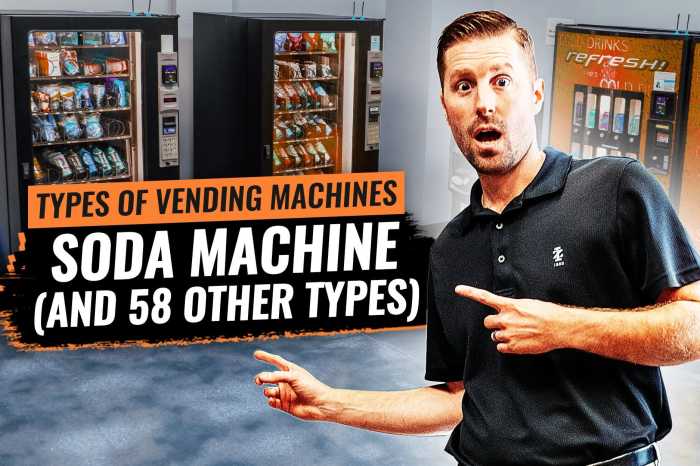
You’ve got your vending machine, you’ve chosen the perfect location, and you’re stocked up with delicious goodies. Now it’s time to get the word out and attract customers! Effective marketing is crucial to the success of your vending machine business, as it helps you reach your target audience and drive sales.
Location Branding
Location branding is about making your vending machine stand out and become a recognizable part of its surroundings. This can be achieved through various strategies:
- Eye-Catching Signage:A well-designed sign that clearly displays your brand name, logo, and what you offer can make a big difference in attracting attention. Consider using vibrant colors, bold fonts, and even playful graphics to grab people’s attention.
- Themed Decor:Decorate your vending machine to match the theme of its location. For example, if it’s near a school, consider using bright colors and fun designs. If it’s in a corporate office, go for a more professional look.
- Interactive Elements:Incorporate interactive elements, such as a touch screen or a small game, to engage customers and create a memorable experience. Think of a mini-arcade game that dispenses a prize, like a free snack or a discount on the next purchase.
Promotions and Loyalty Programs
Promotions and loyalty programs are excellent ways to entice customers and encourage repeat business.
- Limited-Time Offers:Introduce special deals or discounts for a limited time, such as “Buy One Get One Free” or “20% Off” to create a sense of urgency and attract customers.
- Contests and Giveaways:Host contests or giveaways on social media or at your vending machine location to generate excitement and increase engagement. For example, offer a free snack or a discount to the person who guesses the most number of items in your vending machine.
- Loyalty Programs:Implement a loyalty program that rewards customers for their repeated purchases. This could involve earning points for each purchase, which can be redeemed for free items or discounts. A simple punch card system is a good starting point, and many vending machine companies offer digital loyalty programs.
Leveraging Social Media and Online Platforms
Social media and online platforms offer a powerful way to connect with your target audience, build brand awareness, and promote your vending machine business.
- Create Engaging Content:Share photos and videos of your vending machine, your products, and customer testimonials. Highlight your unique selling points, such as your selection of healthy snacks or your commitment to using sustainable packaging.
- Run Targeted Ads:Use social media advertising to target your ideal customers based on their demographics, interests, and location. For example, you could target college students in the area around your vending machine with ads promoting your selection of energy drinks and study snacks.
- Partner with Local Businesses:Collaborate with local businesses to cross-promote each other’s products or services. For example, you could offer a discount to customers who present a receipt from a nearby restaurant or coffee shop.
Marketing Channels and Target Audiences
Here’s a table that Artikels various marketing channels and their effectiveness in reaching specific target audiences:
| Marketing Channel | Target Audience | Effectiveness |
|---|---|---|
| Location Branding | People passing by your vending machine | High |
| Promotions and Loyalty Programs | Existing and potential customers | High |
| Social Media Marketing | Young adults, tech-savvy individuals | High |
| Online Advertising | Specific demographics and interests | High |
| Local Partnerships | Customers of partner businesses | Moderate |
| Email Marketing | Existing customers, subscribers | Moderate |
| Print Advertising | Local residents, commuters | Low |
Managing and Maintaining Your Vending Machine Business
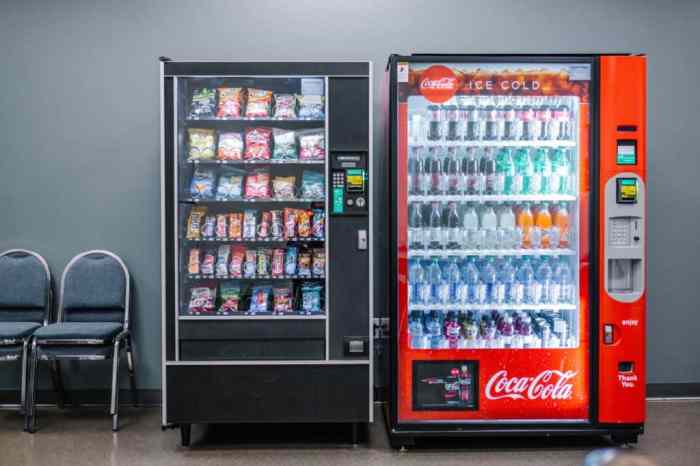
Once you’ve set up your vending machine business, it’s time to keep it running smoothly. This involves managing your inventory, restocking, collecting payments, and ensuring your machines are secure and in good working order. It’s like being the CEO of your own little vending empire, and it’s all about keeping your machines stocked, secure, and ready to serve up profits.
Inventory Management and Restock Strategies
Keeping your vending machines stocked with popular items is crucial to maximizing your profits. You need to know what’s selling and what’s not, and you need to restock regularly to avoid empty machines. Here are some strategies to keep your inventory on point:
- Track sales data.Most vending machines have built-in tracking systems that tell you which items are selling the best. You can use this data to decide which items to stock more of and which items to phase out.
- Create a restock schedule.Set up a regular schedule for checking your machines and restocking. You can start with weekly checks and adjust based on your sales volume.
- Use a point-of-sale (POS) system.A POS system can help you manage inventory and track sales data in real time. This can give you a better understanding of your inventory needs and help you make informed decisions about restocking.
- Partner with a distributor.Many distributors specialize in supplying vending machines with a wide range of products. They can often provide you with discounts and make the restocking process easier.
Collecting Payments and Ensuring Security
Collecting payments from your vending machines is a crucial part of the process, and ensuring the security of your machines is just as important. You want to make sure your money is safe and that your machines are protected from vandalism and theft.Here are some strategies for collecting payments and ensuring security:
- Choose the right payment system.Consider offering a variety of payment options, including cash, credit cards, and mobile payments. This will make it easier for customers to buy your products and help you increase your sales.
- Install a security system.A security system can help deter theft and vandalism. Consider using cameras, alarms, and other security measures to protect your machines.
- Choose secure locations.Place your machines in well-lit, high-traffic areas that are visible to the public. This will help deter theft and vandalism.
- Regularly collect cash.Don’t let cash build up in your machines for too long. Collect it regularly and deposit it in a secure location. Think of it like the bank run, but for your vending machines.
Maintenance and Troubleshooting
Like any machine, vending machines need regular maintenance to keep them running smoothly. This includes cleaning, inspecting, and troubleshooting any problems. It’s like giving your machines a regular check-up to make sure they’re in tip-top shape.Here are some key maintenance tasks:
- Clean your machines regularly.Dust, dirt, and debris can build up in vending machines, causing them to malfunction. Clean your machines regularly, both inside and out, to keep them running smoothly. Think of it like giving your vending machine a spa day.
- Inspect your machines for wear and tear.Look for any signs of damage, such as cracks, dents, or loose parts. Replace any worn or damaged parts as needed. Remember, preventative maintenance is key to avoiding bigger problems down the road.
- Troubleshoot problems quickly.If a vending machine malfunctions, troubleshoot the problem quickly to minimize downtime. You can find troubleshooting guides online or contact your machine’s manufacturer for support.
- Schedule regular maintenance.Schedule regular maintenance appointments with a qualified technician to ensure your machines are in good working order. Think of it like taking your car in for an oil change, but for your vending machine.
Book Review
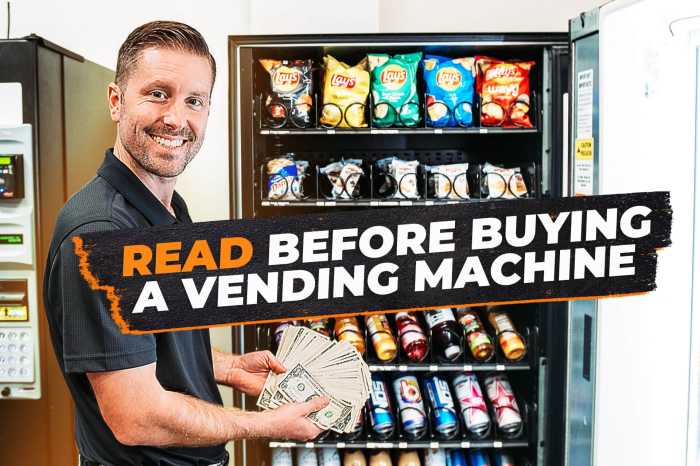
If you’re looking to dive deep into the vending machine business, “The Vending Machine Handbook: A Complete Guide to Starting and Running a Successful Vending Business” by John R. Bolles is a great place to start. This book covers everything from choosing the right vending machine to marketing and promoting your business.
Key Insights and Practical Advice
Bolles’ book offers a comprehensive overview of the vending machine business, providing practical advice and insights that can help you succeed. Here are some key takeaways:* Understanding the Vending Machine Market:The book provides a detailed overview of the vending machine market, including its size, growth potential, and key trends.
It also discusses the different types of vending machines available and the products that are most popular with consumers.
Building a vending machine business is all about finding the right location and stocking the right stuff, just like knowing the right chords and techniques to master the accordion. If you’re looking to learn how to play the accordion in a specific style, you might want to check out El Acordeón de Merengue Típico Teoría Técnica y Ejercicios (Spanish Edition).
But back to vending machines, once you’ve got your strategy down, it’s like watching your profits grow like a vine, reaching for the sky!
Choosing the Right Vending Machine
Bolles emphasizes the importance of selecting the right vending machine for your business. He provides guidance on factors to consider, such as the type of product you’ll be selling, the location of your vending machine, and your budget.
Finding the Perfect Location
The book explores the importance of location for vending machine success. It offers strategies for identifying high-traffic areas and securing prime vending spots.
Marketing and Promoting Your Business
Bolles provides valuable tips on marketing and promoting your vending machine business. He discusses the use of signage, social media, and other marketing channels to attract customers.
Managing and Maintaining Your Vending Machine Business
The book delves into the essential aspects of managing and maintaining your vending machine business. It covers topics such as inventory management, cash handling, and troubleshooting machine issues.
Strengths and Weaknesses
While “The Vending Machine Handbook” offers valuable insights, it’s important to consider its strengths and weaknesses.
Strengths
- Comprehensive Coverage:The book covers a wide range of topics related to the vending machine business, making it a valuable resource for aspiring and established entrepreneurs.
- Practical Advice:Bolles provides practical advice and tips that can be applied to real-world scenarios.
- Easy-to-Read Style:The book is written in a clear and concise style, making it easy to understand and follow.
Weaknesses
- Outdated Information:Some of the information in the book, particularly regarding technology and marketing trends, may be outdated.
- Lack of Depth:The book provides a good overview of the vending machine business, but it could benefit from more in-depth coverage of specific topics.
Recommended Resources
To supplement the information in “The Vending Machine Handbook,” consider exploring these additional resources:* Online Communities:Join online forums and communities dedicated to vending machine entrepreneurship. These platforms offer valuable insights, networking opportunities, and support from experienced professionals.
Vending Machine Industry Associations
Organizations such as the National Automatic Merchandising Association (NAMA) provide resources, education, and networking opportunities for vending machine operators.
Industry Publications
Stay up-to-date on industry trends and news by subscribing to industry publications such as Vending Times and Automatic Merchandiser.
Closure
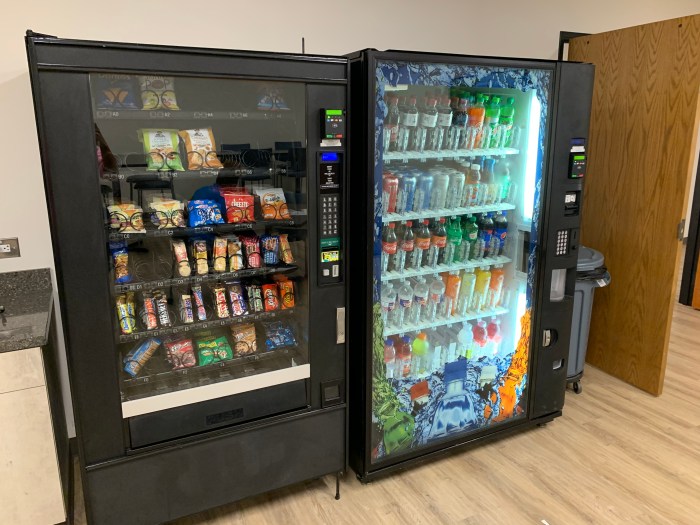
So, there you have it – a step-by-step guide to building a vending machine business that’s ready to make you some serious cash. Remember, it’s all about finding the right niche, selecting the perfect locations, and providing the best products to your customers.
Stay ahead of the curve, keep your machines stocked and maintained, and you’ll be on your way to building a vending machine empire that’s as profitable as it is fun. Ready to take the leap? Get out there and start building your own money machine!
User Queries
What are the most profitable types of vending machines?
The most profitable types of vending machines depend on your location and target audience. Some popular options include snack and beverage machines, candy machines, and even machines that sell things like phone chargers, headphones, and other small electronics.
How much does it cost to start a vending machine business?
The cost of starting a vending machine business can vary widely depending on the type of vending machines you purchase, the number of machines you want to operate, and the products you sell. You can expect to spend anywhere from a few hundred dollars to several thousand dollars to get started.
How do I find good locations for my vending machines?
The best locations for vending machines are high-traffic areas with a lot of potential customers. Think places like office buildings, schools, gyms, hospitals, and even airports. You’ll want to find locations where people are likely to be hungry, thirsty, or in need of a quick snack or beverage.

